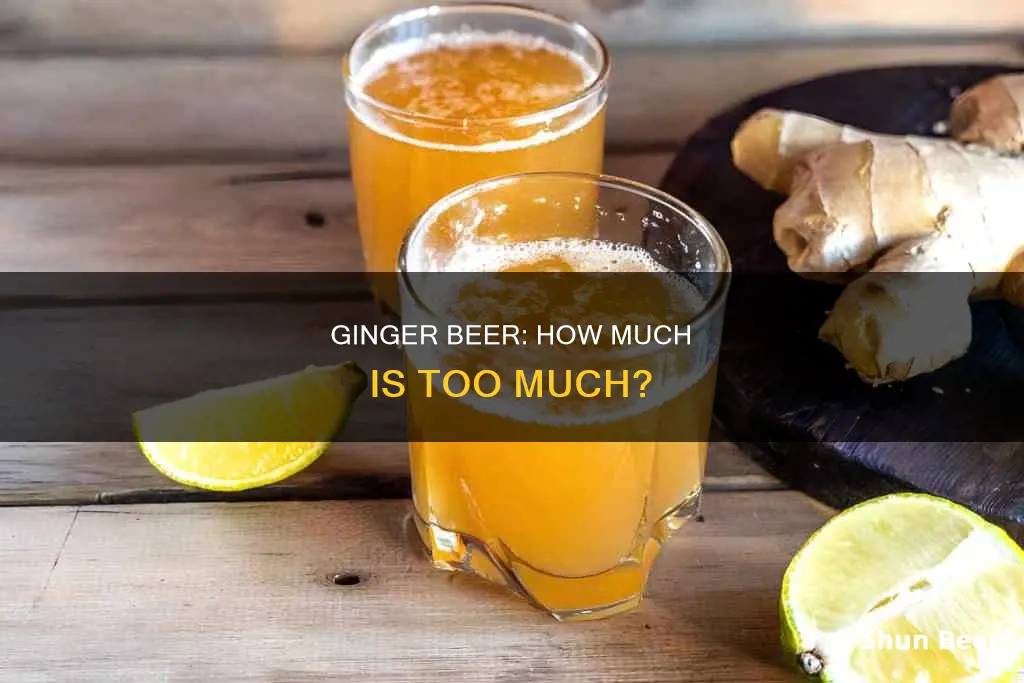
Ginger beer is a drink with a robust, spicy, and aromatic flavour. It is made from a blend of ginger, water, and sugar, and is often carbonated and bottled. While most ginger beers are non-alcoholic, some contain a small amount of alcohol. The drink is known for its health benefits, such as aiding digestion and providing relief from nausea and vomiting. However, excessive consumption can lead to negative side effects such as bloating, gas, and digestive issues. Therefore, it is important to drink ginger beer in moderation and be mindful of the potential risks associated with excessive consumption.
| Characteristics | Values |
|---|---|
| Alcohol content | Most ginger beers are non-alcoholic. However, some contain a small amount of alcohol, with an ABV of less than 0.5%. Traditional ginger beer had an ABV of about 11%. |
| Health benefits | Ginger beer has anti-inflammatory properties, aids digestion, relieves nausea, and may have anti-cancer properties. |
| Serving suggestions | Ginger beer can be drunk on its own or used as a mixer in cocktails such as the Moscow Mule. It pairs well with citrus juices like orange and lemon, and with spicier flavours like cinnamon and nutmeg. |
| Consumption | It is recommended to drink ginger beer in moderation. Excessive consumption can cause digestive issues such as bloating, gas, and diarrhoea. |
What You'll Learn

Ginger beer's health benefits
Ginger beer has a multitude of health benefits, primarily due to its key ingredient, ginger root.
Firstly, ginger beer is an effective remedy for nausea and morning sickness. This is due to the active substances gingerol and shogaol, which are found in ginger root. These substances help to relieve stomach irritation and other digestive discomforts. They also aid the body's production of saliva and bile, which in turn assists digestion.
Secondly, ginger beer has anti-inflammatory properties. This is beneficial in alleviating musculoskeletal pain and suppressing tissue inflammation. The potassium content in ginger also provides detoxification support, working with the body's antioxidants to eliminate harmful free radicals.
Thirdly, ginger beer can help to prevent cancer. Studies have shown that ginger can kill off colorectal cancer cells and prevent them from growing back. Other active compounds in ginger, such as zingerone and paradol, also exhibit chemopreventative properties that can stop the destructive activities of cancer cells.
Fourthly, ginger beer can help to prevent and treat diabetes. It has been shown to reduce blood glucose levels, which can slow the progression of the disease.
Finally, ginger beer can help to combat heart disease and heart attacks. The antioxidant and anti-inflammatory properties of ginger may help to prevent heart attacks and reduce cholesterol levels.
It is important to note that, while ginger beer has many health benefits, it should still be consumed in moderation. Excessive consumption can lead to digestive issues and the added sugar can increase the risk of chronic diseases.
Drinking 20 Beers: A Night to Remember or Forget?
You may want to see also

How much is too much?
Ginger beer is generally considered healthy, with several medicinal properties. However, excessive consumption can lead to adverse effects, similar to those of other carbonated drinks.
Firstly, it is important to distinguish between alcoholic and non-alcoholic ginger beer. While the former was more common in the past, most ginger beers today are non-alcoholic. The alcoholic variety typically contains 4-6% ABV, similar to light beer or cider. Consuming too much of this type of ginger beer can lead to drunkenness and hangovers. Therefore, it is important to treat it like any other alcoholic beverage and consume it in moderation.
Non-alcoholic ginger beer, on the other hand, is usually considered safe for consumption by people of all ages, including pregnant women. However, excessive consumption can still lead to health issues. The carbonation in ginger beer can cause digestive problems such as bloating, gas, and diarrhea. Additionally, the added sugar in ginger beer can increase the risk of chronic conditions such as obesity and diabetes when consumed in large amounts over a long period.
Furthermore, ginger itself, the key ingredient in ginger beer, has medicinal properties that can be beneficial in moderate amounts but may have adverse effects in excess. For example, ginger is known to have anti-inflammatory properties and can aid in pain relief. However, consuming too much ginger can lead to an increased risk of bleeding, especially for those taking blood-thinning medications. Excessive ginger intake can also cause heartburn, gas, and diarrhea.
Therefore, while ginger beer can be a refreshing and healthy drink, it is important to consume it in moderation, just like any other beverage. The recommended daily intake of ginger is 3-4 grams, which is much less than the amount found in a typical bottle of ginger beer. So, it is best to enjoy ginger beer in moderation and be mindful of the potential health risks associated with excessive consumption.
Working with Beer Distributors: Strategies for Mutual Success
You may want to see also

Alcoholic vs non-alcoholic ginger beer
Ginger beer is a drink with a long history, and its alcohol content has changed over time. Today, there are alcoholic and non-alcoholic varieties available, and it is important to check the label to know which type you are consuming.
Alcoholic Ginger Beer
The traditional ginger beer of England in the 17th, 18th, and 19th centuries was an alcoholic beverage, brewed through the fermentation of ginger, sugar, and water. This process is similar to that of brewing beer, and the resulting drink could contain up to 11% alcohol.
Today, alcoholic ginger beer is usually labelled as such and is sold worldwide. It typically contains 4-6% alcohol by volume (ABV), though this can vary depending on the recipe used.
As with all alcoholic drinks, it is important to consume alcoholic ginger beer in moderation and to be aware of the risks associated with excessive drinking.
Non-Alcoholic Ginger Beer
Most commercial ginger beers today are non-alcoholic. They are usually carbonated and may be manufactured rather than brewed, with flavour and colour additives, and artificial carbonation.
Non-alcoholic ginger beer is often classified as a soft drink and can be a great alternative for those who want to avoid alcohol but still enjoy the taste and sensation of drinking beer. It is an excellent option for those who are pregnant or unable to consume alcohol for other reasons.
However, it is important to note that even non-alcoholic ginger beer should be consumed in moderation due to its high sugar content, which can contribute to health issues such as obesity and diabetes if consumed in large amounts over a long period.
Health Benefits of Ginger Beer
Whether alcoholic or non-alcoholic, ginger beer has several potential health benefits due to the presence of gingerol, a natural compound found in ginger root. These benefits include:
- Relief from nausea and improved digestion
- Anti-inflammatory properties, which can help with various types of body inflammation and pain
- Anti-bacterial properties, which can help fight off certain bacteria
- Potential anti-cancer properties, though more research is needed to confirm this
- Slowing down the signs of ageing
- Promoting good mental health and improving brain function
Beer: A Potential COVID-19 Killer?
You may want to see also

Making ginger beer at home
Ginger beer is a refreshing drink with a number of health benefits, and it can be made at home. Here is a detailed, step-by-step guide on how to make ginger beer at home.
Ingredients and Equipment:
- Grated ginger (fresh or dried)
- Sugar
- Lemon juice
- Yeast (baker's, brewer's, or champagne yeast)
- Water (filtered, distilled, or spring water is recommended)
- Cream of tartar (optional)
- Clean 2-liter plastic bottle with a screw-top or glass bottles with swing-tops
- Funnel
- Fine strainer or coffee filter
- Kitchen towel
- Pitcher
Simplified Ginger Beer Method:
- In a large pot, combine the grated ginger, cream of tartar (if using), and lemon juice.
- Add 4 cups of water and bring the mixture to a boil.
- Turn down the heat, add the sugar, and stir until the sugar is dissolved.
- Add 5 cups of cold water to the pot and allow the mixture to cool to around 75°F (23°C).
- Add the yeast and stir well.
- Cover the pot with a kitchen towel and store it in a warm, dark place for about 3 hours.
- Transfer the mixture to a large pitcher. Use a fine strainer or coffee filter to remove the bits of ginger.
- Pour the liquid into clean bottles, leaving some space at the top to allow for carbon dioxide production during fermentation.
- Place the bottles in a warm, dark place and let them ferment for 2 to 3 days, depending on how sweet or dry you want your ginger beer.
- Carefully loosen the caps a few times a day to release pressure and prevent the bottles from exploding.
- Refrigerate the ginger beer to slow down the fermentation process and enjoy your homemade drink!
Authentic Ginger Beer Method:
This method uses a "ginger bug," which is a collection of beneficial bacteria and yeast. It takes longer but results in a beverage rich in probiotics.
- Combine grated fresh ginger, sugar, and water in a glass jar and stir until the sugar is dissolved.
- Cover the jar with a towel or cloth and secure it with rubber bands.
- Let the mixture sit at room temperature for 5 to 7 days. Once a day, add an additional 2-3 tablespoons of sugar and grated ginger.
- Check if it's ready by looking for bubbles and a sharp, yeasty smell.
- Combine the ginger bug with grated ginger, sugar, salt, and water in a pot. Bring to a boil and simmer for 5 minutes, stirring occasionally.
- Remove from the heat, add the remaining water, and allow the mixture to cool to room temperature.
- Strain out the ginger bits and add lemon juice, stirring well.
- Pour the liquid into clean glass bottles, leaving some space at the top.
- Keep the bottles in a warm, dark place and let them ferment for about 10 days, loosening the caps a few times a day to release pressure.
- Refrigerate the ginger beer to slow down fermentation and enjoy!
Notes:
- The longer you ferment the beverage, the less sweet and more dry it becomes.
- You can customize your ginger beer by adding fruit juices for extra flavor or liquor to make it alcoholic.
- Be cautious when opening the bottles, as the beverage will be carbonated and highly pressurized. Always point the bottles away from your face and others' faces.
Why Drinking Beer Makes It Hard to Burp
You may want to see also

Ginger beer's food pairings
Ginger beer is a versatile drink that can be paired with various dishes to enhance your dining experience. Here are some food pairings to consider when enjoying a ginger beer:
- Seafood: The neutrality of light, simply seasoned fish pairs well with the kick of ginger and lime in a ginger beer. Avoid rich, creamy sauces as they can create an unwelcome contrast. Instead, opt for dishes like fish and chips, blackened catfish, or BBQ shrimp kebabs.
- Curry: Ginger is a common ingredient in curries, so this pairing enhances the drink's flavour. Stick to lighter curries with fish, chicken, or vegetables as the base. Beef and lamb curries may overpower the drink with their stronger, gamier flavours. Try butter chicken, onion bhaji, or shrimp masala for a perfect match.
- Mexican: A well-made Moscow Mule pairs beautifully with Mexican dishes like tacos, shrimp ceviche, or pollo a la plancha. The fatty proteins, acidic pickled vegetables, and house-made hot sauce complement the ginger and lime flavours in the drink.
- Cheese and Charcuterie: Select cheeses and meats that mirror the kick of a Mule. Goat cheese, aged cheddar, and golden-fried Greek Halloumi are excellent choices. For meats, think salty and fatty—spicy chorizo, prosciutto, Iberico ham, and Bresaola will all make your Mule seem positively refreshing.
- Spicy or Highly-Seasoned Foods: The carbonation and spiciness of ginger beer make it a perfect match for spicy or highly-seasoned foods. The drink's fizz and ginger kick can help cut through the heat of a dish, providing a refreshing contrast.
- Sweet Glazes and Sauces: Ginger beer also goes well with foods that have sweet glazes or sauces, such as barbecue or glazed ham. The drink's spiciness can balance out the sweetness of these dishes, creating a delightful flavour combination.
Drinking Beer in the Back Seat: What's the Law?
You may want to see also
Frequently asked questions
Yes, ginger beer is good for your stomach. It has been used for centuries to help with digestive ailments, nausea, and other stomach ailments.
Ginger beer has many health benefits, including anti-inflammatory properties, aiding in detoxification, and providing relief from nausea and morning sickness. However, it is high in sugar and carbonation, which can cause digestive issues if consumed in excess.
The alcohol content of ginger beer varies depending on the brand and recipe. Most commercially produced ginger beers contain less than 0.5% alcohol, while traditional ginger beers can have up to 11% alcohol.
Yes, ginger beer is generally considered safe for pregnant women to consume. The ginger in the drink may help with pregnancy-related nausea and morning sickness. However, it is always recommended to consult with a healthcare provider before consuming any new beverages during pregnancy.
Ginger beer should be consumed in moderation as part of a balanced diet. While it offers several health benefits, excessive consumption can lead to digestive issues and increased risk of chronic diseases due to its high sugar content.







